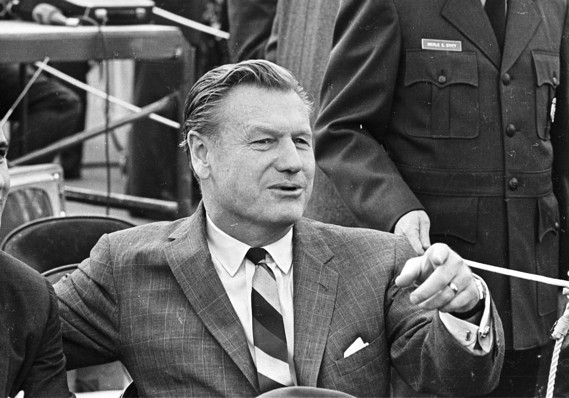Journalists and historians can — we get it — perform moral outrage well. Consider the Times on Stephen Bannon:
[T]he defining moment for Mr. Bannon came Saturday night in the form of an executive order giving the rumpled right-wing agitator a full seat on the “principals committee” of the National Security Council — while downgrading the roles of the chairman of the Joint Chiefs of Staff and the director of national intelligence, who will now attend only when the council is considering issues in their direct areas of responsibilities. It is a startling elevation of a political adviser, to a status alongside the secretaries of state and defense, and over the president’s top military and intelligence advisers.
The quotation comes from John Haines piece on Bannon’s appointment to the NSC in historical perspective:
While Mr. Bannon has sardonically compared himself to “Thomas Cromwell in the court of the Tudors” (perhaps choosing to ignore how that role ended), his national security brief might better analogize to Nelson Rockefeller. As noted earlier, he succeeded C.D. Jackson as Special Assistant to the President for Cold War Planning in the Eisenhower administration. Mr. Rockefeller’s appointment was memorialized in a March 1955 memorandum to President Eisenhower from Rowland Hughes, the director of the Bureau of the Budget (later renames the “Office of Management and Budget”):
b.The appointment of Mr. Nelson Rockefeller as Special Assistant to the President to provide leadership on your behalf in the development of increased understanding and cooperation among all peoples and in reviewing and developing methods and programs by which the various departments and agencies of the Government may effectively contribute to such cooperation and understanding.
c.The assignment to a Special Committee chaired by Mr. Rockefeller of responsibility for coordinating the implementation of the policies contained in NSC 5505/110 and NSC 5502/1.
Mr. Rockefeller assumed a direct role in national security and intelligence operations when President Eisenhower named him chair of the Planning Coordination Group (PCG), which was subordinate to the NSC’s Operations Coordinating Board (OCB). The OCB was established by a September 1953 executive order “to provide for the integrated implementation of national security policies by the several agencies.”[26] According to a letter to Director of Central Intelligence Allen Dulles, “At the time of the issuance of the Executive Order creating the OCB the President designated his Special Assistant for Cold War Planning as his representative on the OCB.”
President Eisenhower authorized the PCG in a 10 March 1955 letter to Mr. Rockefeller. He directed that the PCG was to be advised “in advance of major covert programs initiated by the Central Intelligence Agency;” and furthermore, that the PCG “should be the normal channel for giving policy approval for such programs as well as for securing coordination of support therefor among the Departments of State and Defense and the Central Intelligence Agency.” The two referenced NSC reports — NSC 5505/1 (“Exploitation of Soviet and European Satellite Vulnerabilities”) and NSC 5502/1 (“U.S. Policy Toward Russian Anti-Soviet Political Activities) — are January 1955 directives for an “active political warfare strategy” against the Soviet Union.
Mr. Rockefeller’s brief was defined in a March 1955 NSC memorandum that discussed “The Foreign Information Program and Psychological Warfare Planning.” Declaring “the principle that propaganda in both peace and war is a continuing mechanism of national policy directed toward the achievement of national aims,” the NSC charged Mr. Rockefeller to conduct:
[A] high level review of the existing arrangements in the light of NSC 59/1 and NSC 127/1 should be undertaken with a view to preparing appropriate recommendations for consideration by the National Security Council. Such a review should be undertaken with a full understanding of the existing arrangements and current plans and programs in this field, as well as the status of planning for the possibility of limited or general war.
The NSC further directed that “responsibility for making such a review and recommendations [was] assigned to Mr. Nelson Rockefeller as Special Assistant to the President:”
[T]o provide leadership in the development of increased understanding and cooperation among all peoples and in reviewing and developing methods and programs by which the various departments and agencies of the Government may effectively contribute to such cooperation and understanding. In this assignment Mr. Rockefeller should be provided with such advice and assistance as he requires from the Bureau of the Budget, the Office of Defense Mobilization and the Operations Coordinating Board as well as the responsible operating departments and agencies.
Never let real historical details get in the way of surreal moral outrage. Do notice that Bannon is not as well dressed or coiffed as the Ivy League’s own, Rockefeller.


Kissinger kept secrets from Nixon, and Nixon kept secrets from Kissinger, and Cheney kept secrets from W.
At least Pat Robertson and Paula White and Jerry Falwell do not keep secret their private conversations with God. Since Falwell sometimes made up lies about his conversations with Reagan, one wonders if he always told the truth about his talks with God (or even if he ever talked with God)
Since Trump does not seem to talk to God, perhaps Trump needs to hire an “evangelical” speechwriter to put some confessional language on his teleprompter. —-“there is power, wonder-working power, in the goodness and idealism and faith of the American people.”
https://www.theatlantic.com/magazine/archive/1982/05/kissinger-and-nixon-in-the-white-house/308778/
LikeLike